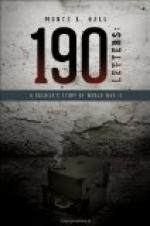Indeed, strength was called for day by day. This ‘adaptation’ was no transformation. But by a continuous act of vital energy he assimilated all that he drew from his surroundings. Thus he fed his heart, and kept his own ideals. This was a way to renounce all things, and by renunciation to keep the one thing needful, to remain himself, to live, and not only to live but to flourish; to have a part in that universal life which produces flowers in nature, art and poetry in man. To gain so much, all that was needed was to treasure, unaltered by the terrors of war, a heart eager for all shapes of beauty. For this most religious poet, beauty was that divine spirit which shines more or less clearly in all things, and which raises him who perceives it higher than the accidents of individual existence. And he receives its full influence, and is rid of all anxiety, who is able to bid adieu to the present and the past, to regret nothing, to desire nothing, to receive from the passing moment that influence in its plenitude. ’I accept all from the hands of fate, and I have captured every delight that lurks under cover of every moment.’ In this state of simplicity, which is almost a state of grace, he enters into communion with the living reality of the world. ’Let us eat and drink to all that is eternal, for to-morrow we die to all that is of earth.’
That emancipation of the soul is not achieved in a day. The earlier letters are beautiful, but what they teach is learnt by nearly all our soldiers. In these he tells of the spirit of the men, their fire of enthusiasm, their imperious sense of duty, their resolve to carry ’an undefiled conscience as far as their feet may lead.’ Yet already he is seeking to maintain control of his own private self amid all the excitement of numbers. And he succeeds. He guards himself, he separates himself, ‘as much as possible,’ in the midst of his comrades, he keeps his intellectual life intact. Meanwhile he is within barrack walls, or else he is jotting down his letters at a railway station, or else he is in the stages of an interminable journey, ‘forty men to a truck.’ But to know him completely, wait until you see him within the zone of war, in billets, in the front line, on guard, when he has returned to contact with the very earth. As soon as he breathes open air, his instincts are awake again, the instinct ‘to draw all the beauty out,’ and—in the shadow where the future hides—’to draw out the utmost beauty as quickly as may be.’ ’I picked flowers in the mud; keep them in remembrance of me,’ he will write in a day of foreboding. A most significant trait is this—in the tedium of trench days, or when imminent peril silences the idle tongues, he gathers the greatest number of these magical flowers. In those moments when speech fails, his soul is serene, it has free play, and we hear its own fine sounds. Hitherto we had heard the repetition of the word of courage and of brotherhood uttered by all our gathering armies.




